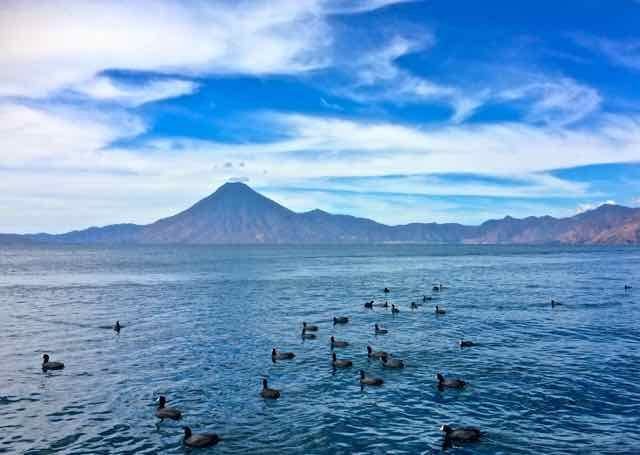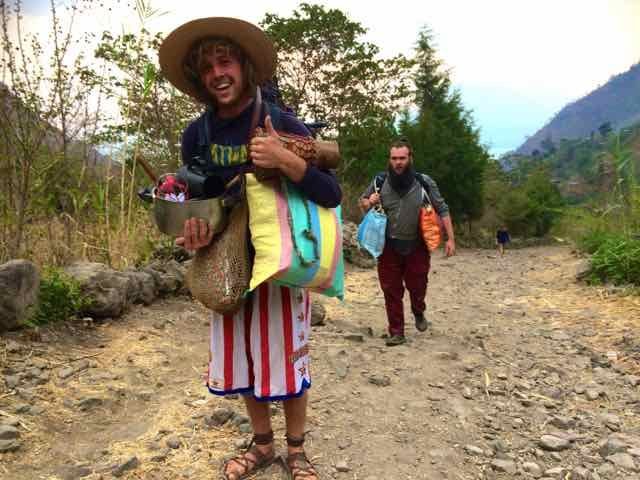What is Permaculture?
I'll start with an encouragement, in the form of the below picture, about how Lake Atitlan is absolutely stunning and how anybody with the ability should visit that place and find @squdsi1 's farm.

Now, what is Permaculture? The explanation that would be given to an 8 year old would go something like, "Permaculture is building a better place to live."
You can think of it as a tool that tells you what tools to use. Permaculture systems are alive in many indigenous communities and are inspired by a whole world of different strategies but those systems alone are not quote un-quote "Permaculture". It's a way of using many different systems, trying to find a way for those systems to work together, making them multifunctional, and encouraging them to become more stable by supporting each other. It uses whats available to where you are, who you are, and what your goals want to be. It's super flexible yet stays in-line with a set of ethics and principles.
It's a super conscious aware way to design every aspect of your life. That's a little much right? I know. Have I bored you? Have I lost you? One must realize when defining Permaculture, you must take into consideration who you are speaking with. You so lets have a look at some alternative definitions.
PERMACULTURE IS:
"Designing ecological culture." This is from Dave Jacke who wrote one of the most enjoyable books on permaculture for cold climates.
"We are nature, working." From Penny Livingston Stark who goes on to say permaculture is about mimicking the nature, optimizing your footprint and maximizing your handprint.
"Permaculture is a framework for ethical and ecological decision making." David Holmgren was a grad student working with the godfather of permaculture, Bill Mollison. Together they coined the phrase permaculture, developed, spread, and published the methods.
And from the godfather himself, "The design implementation and maintenance of agriculturally productive ecosystems that have the stability, resiliency and diversity of naturally occurring ecosystems."
Again, take it upon yourself to observe and consider who you are speaking with when trying to define permaculture. Are you talking to a person who is genuinely interested, a city professional, a local farmer, a friend, an older family member or a happy hippy you come across on the path? I'll tell you 'we are nature, working' for example would be a good way to describe it to this good friend featured in the picture below but perhaps not to others.

Whatever definition you might find resonates best for you is fine. One thing that sets permaculture apart and above other theories or ideas or methods is that it follows a set of 3 ethics and 12 principles. If you wonder if what you are doing is permaculture, run it through the principles and always keep the ethics in mind.
The Ethics of Permaculture
EARTH CARE
PEOPLE CARE
FAIR SHARE
It's not hard these days to see a word like 'organic' be misused, abused and greenwashed because what is or was classified as 'organic' didn't have a set of ethics.
The Principles of Permaculture
Observe and interact
- extended observations, all are useful even if you don't know why
Catch and store energy
- cycle energy through a site
Obtain a yield
- think creatively about yields, use it or fear neglect
Apply self regulation and accept feedback
- set rules but accept feedback to change to what works
Use and value renewable resources and services when appropriate
- always favour biological solutions
Produce no waste
- waste is an unused output of a system
Design from patterns to detail
- pattern recognition is the precursor to design
Integrate rather than segregate
- make functional connections
Use slow and small solutions and decentralize
- take care of the rain as it falls rather than in one huge chunk
Use and value diversity
- strength in numbers
Use edges and value the marginal
- edge is where the action is
Creatively use and respond to change
- don't react - respond
.jpg)
One of the golden rules is that every element should have 3 functions and every important function should be supported by 3 elements.
Finally and again always remember, when questioning whether or not anything is really permaculture, run it through the principles.
Atitlan Organics.This post was written from my personal notes taken from a lecture by @squdsi1 at
hami -
@hami I think that is my favourite definition of permaculture: "Permaculture is building a better place to live." Thanks for the post and for the shout outs!
Straight from the Squdsi's mouth. I like that one very much. Thanks. And I've been spelling your name wrong on my posts for some time now. Fixed